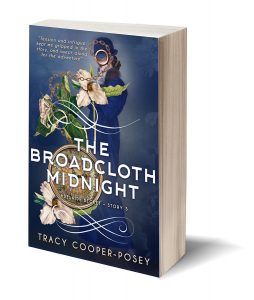Long Series and Left-Turning Episodes (and the next Adelaide Becket is out!)
Are you wary when you start a new TV series? Braced to maybe be disappointed? And how many episodes do you give a new TV series before booting it to the curb?
A long time ago, Mark and I agreed that we had to give a new TV series at least six episodes before quitting. It takes about that many episodes for the show to get past the crime-of-the-week, or whatever it is the show is about. Adventure-of-the-week, mystery-of-the-week, space-battle-of-the-week.
By around the sixth episode, the show usually finds its feet, and settles into the type of story telling that brands the rest of the series. By then, it’s safe to quit or stick. I say usually, although there are several beloved series I can think of that didn’t really get their shit together until season two (I’m looking at you, Star Trek: The Next Generation).
I’m glad we agreed upon this policy of waiting a few episodes, because we’ve found some excellent TV series that were bland for the first few. Dexter is a case in point. We were talking about giving up on it after two or three, but the policy kept us watching for three more…and the storytelling suddenly jumped into the stratosphere. We stuck for the rest of the series.
TV series that manage to get away from the thing-of-the-week story-telling (another name for it is episodic story-telling–a very traditional form for TV shows) often end up with long-running character arcs, story arcs, sub-story arcs, and convoluted backstories.
They’re also not afraid to experiment. Every now and then you’ll get an episode that is completely different from the norm. It’ll flash back into history, say, and all the regular cast play roles in 1930’s loungewear (Castle), or Prohibilition style (Star Trek, the original series). Or there is an episode that takes place entirely on one set (one room), over a single period of time that matches the episode length. West Wing broadcast the final season’s Presidential Debate live. There’s some dandy out-of-character episodes all throughout TV history. M.A.S.H. was famous for them, later in their run.
One of my favourite out-of-character episodes is from the little-known Due South series. In the first season, there’s a left-turning episode called “You Must Remember This“. The whole series is whacky, I admit, but this eleventh episode the whackiness took a sharp turn and paused for a single beat. The episode features a stake-out, with the characters holed up in a ramshackle room, watching the apartment across the road.
What made the episode so different is that halfway through, deep in the middle of the night, Ray is asleep, while Frazier (the main character, played by the gorgeous Paul Gross) is watching the apartment. Frazier goes into a soliloquy about a long lost love that makes the hairs on the back of your neck stand up. This is the first time the series gets, well, serious. It’s the first hint about the love of Frazier’s life, Victoria, and it sets up the jaw-dropping and heart-stopping three-part season finale, “Victoria’s Secret”.
I was locked into the series completely and utterly, after that single skewed episode.
And I kept recalling the episode while writing The Broadcloth Midnight.
If you’re familiar with Due South, and the “You Must Remember This” episode (there are at least three versions on YouTube, if you’re curious), then you’ll recognize my homage when you read The Broadcloth Midnight. It has the same feel, the same we’re-switching-gears-here feeling.
The Broadcloth Midnight was released this morning on all retailers.
Lady Adelaide has had enough…

Lady Adelaide Azalea Margaret de Morville, Mrs. Hugh Becket, cannot sleep. After weeks of brooding about the severe drawbacks of her work for William Melville, spymaster, she travels through London at midnight to find Melville and tell him she will no longer work for him.
Instead, Adele finds herself in the company of Torin Slane, the Irish professor and Fenian, and Daniel Bannister, Baron Leighton, as they monitor the house of a possible German agent.
The company and conversation, and the events they witness in the house they are watching, prove illuminating for Adele and for Melville’s continuing search for a master German spy.
This novelette is the fifth in the Adelaide Becket Edwardian espionage series.
1: The Requisite Courage
2: The Rosewater Debutante
3: The Unaccompanied Widow
4: The Lavender Semaphore
5. The Broadcloth Midnight
…and more to come.
A historical suspense espionage novelette.
Stay well!
